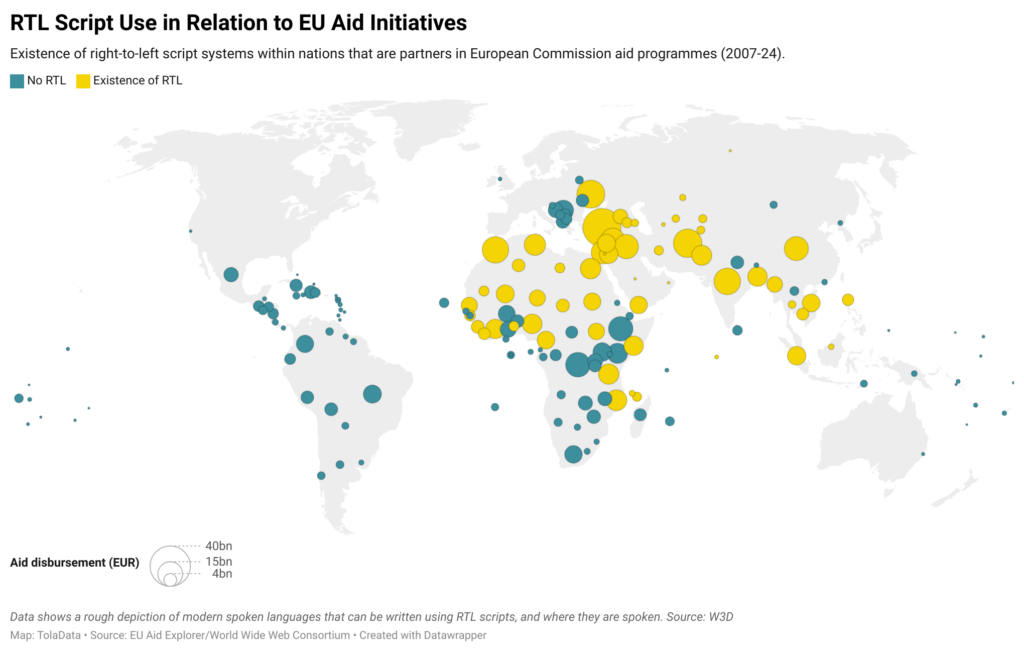With the international aid sector striving for a more equitable development model, TolaData’s language support features are designed to enhance local community engagement and overcome language barriers in digital M&E.
The Challenge of Implementing Localisation: A Decade of Discourse and Delay
At its core, localisation in international aid is about a correction in power dynamics. It is about moving away from the traditional top-down approaches to aid and towards a culture of local actors becoming architects of their own development.
Localisation is an ambitious policy initiative that has persisted in various forms for over a decade. The concept, while frequently discussed and debated within development sectors of the Global North, has seen a sluggish translation into practice, casting doubt among the very communities such efforts aim to support.
Having promised to direct a quarter of funding to local groups by 2025, USAID has even acknowledged likely falling short of their target, citing challenges in forming local partnerships and building teams. In response, the agency is broadening the linguistic accessibility of their WorkWithUSAID platform, previously limited to English, removing a critical barrier to collaboration for many prospective partners.
The Importance of Language in Aid
Clear and effective communication forms the foundation of any impactful aid program. When local organisations can function in their native scripts and languages, they participate more wholly, contribute more meaningfully and advocate with greater assurance.
This leads to better-prepared, more responsive and ultimately more sustainable action. Yet, many systems – both human and digital – often fail to account for language diversity beyond the level of translation. This is especially true for Right-to-Left (RTL) languages, like Arabic, Pashto, Kurdish and Urdu.
The World Wide Web Consortium (W3C), responsible for setting digital standards, recognises 12 scripts and 215 languages written in RTL format. Arabic script, “with 189 languages and just over 2 billion potential users”, stands as the most prevalent among these (for a comprehensive list and further statistics, please refer to the linked resource).
A comparison of this linguistic landscape with the aid distribution patterns from leading global donors reveals a disconnect. Based on data from W3C, we estimate the existence of RTL directional script in around half of all partner countries involved in EU aid initiatives between 2007-24 (see our graphic above). Overlooking this reality in system design not only impedes access but also stifles locally-driven development.
Fostering Inclusivity Through Language Support at TolaData
How are we approaching localisation at TolaData? We understand localisation not as an end-goal but as a framework towards a more bottom-up and equitable approach to measuring impact. As a platform serving thousands of professionals in the social impact sector, we acknowledge our responsibility in helping mainstream people-centred digital tools that aim to increase access and participation for communities to shape their own solutions.
In line with the localisation agenda, TolaData is committed to dismantling communication barriers by providing a multilingual product suite. Our interface is now available in nine languages, and we’ve proudly introduced functionality for Right-to-Left (RTL) scripts, starting with Modern Standard Arabic.
The Significance of Arabic for TolaData and Our Community
With the expansion of our user base in West Asia and North Africa, coupled with our growing global team in the region, we are steadfast in equipping local endeavours with language features crafted by TolaData’s Arabic-speaking experts. We see this feature as more than just a technical enhancement; it represents a commitment to inclusivity and a celebration of the linguistic diversity inherent in the local organisations that form the backbone of developmental efforts.
TolaData’s recent rollout of RTL script support is already fostering local engagement, with projects underway including a significant collaboration with GIZ in Lebanon.
The Impact of RTL Support
By incorporating RTL language support, our goal is to acknowledge the diversity of the regions we serve. This feature enables organisations in RTL language-speaking regions to use our monitoring and evaluation tools, ensuring that language is not an obstacle to actively leading development initiatives.
Our commitment to advancing the localisation agenda reflects our belief that those who are most intimately connected with the challenges at hand are the ones most capable of guiding the journey forward. With our evolving language support features, we aim to offer more than just a product; we’re advocating for a shift towards a more inclusive, equitable and respectful paradigm in international aid and development.
Connect with us to explore how our RTL language support can enhance the work of your organisation and its impact.




